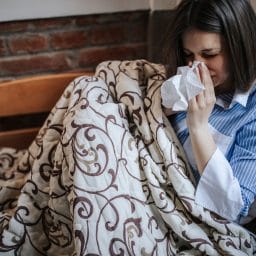Tips for Reducing Mold Allergies

When someone has a mold allergy, it means their immune system overreacts when they inhale mold spores, causing itchy eyes, sneezing, stuffy nose, cough, dry skin and increased asthma symptoms. The best way to prevent these symptoms or decrease their severity is to reduce your exposure to mold spores. We provide six tips on how…
Is Climate Change Affecting Your Allergies?

If you feel like your allergies have been getting worse and worse each year, it’s not just in your head. Many people across the nation have been reporting more severe allergy symptoms, and experts believe this is thanks to climate change. How Common Is Hay Fever? The Centers for Disease Control and Prevention reports that…
How to Prepare for Spring Allergies

Spring is a lovely season full of bright green lawns, beautiful blooms and lovely floral scents. But for people with springtime allergies, it can also entail itchy, watery eyes, congestion, sneezing and a scratchy throat. Fortunately, there are measures you can take to prepare for spring allergies so you can enjoy the beauty around you…
Can Dust Mite Allergies Be Treated with a Pill?

It’s a common misconception that dust can trigger allergies, when it’s actually the microscopic bugs that feed on it known as dust mites. These tiny bugs belong to the same family as ticks and spiders, and they can live in most climates and at most altitudes. They thrive most in warm environments around 70°F and…
What You Should Know About Allergy Tablets

If you can’t visit Historic Fourth Ward Park without getting itchy eyes, runny nose, congestion and sneezing, you may benefit from allergy tablets. Allergy tablets, also known as sublingual immunotherapy, help your body build a tolerance to triggering substances. Below we provide a basic overview of allergy tablets. What Causes Allergies? Your immune system works…
Are Allergy Shots Safe?

Allergies are an incredible nuisance for more than 50 million Americans. While many can manage their symptoms with over-the-counter solutions like antihistamines, nasal sprays, anti-itch creams and eye drops, others require a more long-term solution. This is where allergy shots come in. What Are Allergy Shots? Allergy shots work by helping your immune system build…
Allergy Shots Versus Sublingual Immunotherapy

Immunotherapy is a blanket term for long-term allergy treatment that reduces symptoms over time by decreasing your sensitivity to allergens. There are traditionally two forms of immunotherapy: allergy shots and sublingual immunotherapy (SLIT), also called allergy drops. We compare the two below so you can make the best treatment decision for you or your child….
Understanding Sublingual Immunotherapy

After visiting Atlanta Memorial Park, do you have allergies that are not well-controlled with over-the-counter antihistamines or nasal sprays? If so, you may be a candidate for sublingual immunotherapy (SLIT). Sublingual immunotherapy works similar to subcutaneous immunotherapy (SCIT), more commonly known as allergy shots. They work by slowly increasing your tolerance to allergens over several…
Are Allergies Making You Snore?

According to Johns Hopkins Medicine, approximately 45% of adults snore on occasion, and 25% snore chronically. While you may not be bothered by your snoring, your partner is certain to be. Many people are unaware of the root cause of their snoring, but it’s possible that the source is all around you every day: dust….
Learning About Loss of Smell During the Pandemic

Your ability to smell is an often-overlooked sense that is important to your survival. An inability to smell, known as anosmia, has been in the news lately due to its connection to COVID-19. Understanding the causes of this condition can help ensure you seek treatment when needed. What Is Smell? Your sense of smell is…